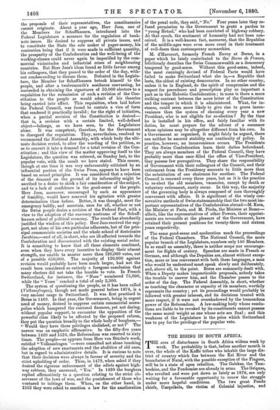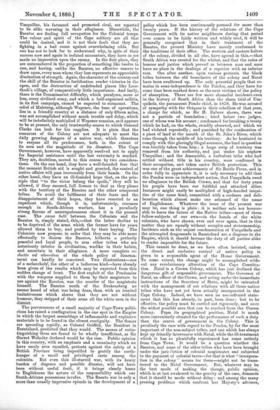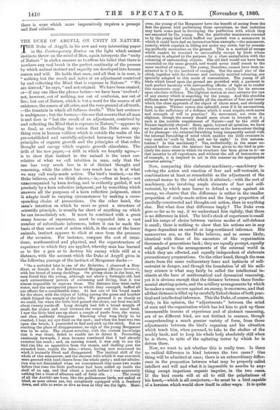THE RISING IN SOUTH AFRICA.
THE area of disturbance in South Africa widens week by week. The probability is that, before another month is over, the whole of the Kaffir tribes who inhabit the large dis- trict of country which lies between the Kei River and the boundaries of Natal, with the possible exception of the Fingoes, will be in a state of open rebellion. The Galekas, the Tam- bookies, and the Pondomise are already in arms. The Griquas, who revolted and were put down as lately as 1878, are only waiting for a favourable opportunity to renew the struggle under more hopeful conditions. The two great Pondo chiefs, Umquikela, the victim of Colonial injustice, and Umquiliso, his favoured and promoted rival, are reported to be alike wavering in their allegiance. Meanwhile, the Basutos are finding full occupation for the Colonial troops. The valour and spirit of the Cape soldiery are all that could be desired, and it is not their fault that they are fighting in a bad, cause against overwhelming odds. But one has not to look far to understand why, in spite of their success now and again in isolated encounters, they have as yet made no impression upon the enemy. In the first place, they are outnumbered in the proportion of something like twelve to one, and having, unlike the Basutos, no effective reserve to draw upon, every man whom they lose represents an appreciable diminution of strength. Again, the character of the country and the skill of the Basutos in fortification render victories in the open, and the destruction of undefended places like Lero- thodi's village, of comparatively little importance. And lastly, there is the Commissariat difficulty, which paralyses, more or less, every civilised army, and which a half-organised militia, in its first campaign, cannot be expected to surmount. The relief of Mafeteng, although Wepener, the base of operations, lies in a friendly country at a distance of only fifteen miles, was not accomplished without much trouble and delay, which will be indefinitely multiplied if Wepener remains, as it appears to be at present, the only trustworthy source to which General Clarke can look for his supplies. It is plain that the resources of the Colony are not adequate to meet the daily growing dangers of a native war, which threatens to surpass all its predecessors, both in the extent of its area and the magnitude of its disasters. The Cape Government, however, have apparently resolved not to apply for Imperial assistance until the last extremity is reached. They are, doubtless, moved to this course by two considera- tions. On the one hand, they have a well-founded fear that the moment British aid is sought and granted, the control of native affairs will pass irrevocably from their hands. On the other hand, they have an ill-founded hope that, on the prin- ciple that " to the victor belong the spoils," they will be allowed, if they succeed, full licence to deal as they please with the territory of the Basutos and the other conquered tribes. To avoid the fulfilment of their fears and the disappointment of their hopes, they have resorted to an expedient which, though it is, unfortunately, common enough in South-African warfare, has a peculiarly strong flavour of unscrupulousness about it in the present case. The casus belli between the Colonists and the Basutos is, simply stated, this,—that the latter decline to to be deprived of the arms which the former have for years allowed them to buy, and profited by their buying. The Colonists now propose, in order that they may be able more effectually to disarm the Basutos, hitherto a perfectly peaceful and loyal people, to arm other tribes who are notoriously inferior in civilisation, warlike in their habits, and uncertain in their allegiance. A more complete re- ductio ad absurdum of the whole policy of disarma- ment can hardly be conceived. Two illustrations—one of a melancholy, the other of a ludicrous kind—have already been given of the results which may be expected from this sudden change of front. The first exploit of the Pondomise with the weapons supplied to them by their magistrate to use against the Basutos, was the murder of the magistrate himself. The Basutos south of the Drakensberg no sooner heard of what was being done, than, with an ironical imitativeness which shows that they are not without humour, they stripped of their arms all the white men in the district.
The perverseness of a small majority of Cape-Town politi- cians has raised a conflagration in the one spot in the Empire in which the largest assemblage of inflammable and explosive materials is to be found in the closest contiguity. The flames are spreading rapidly, as Colonel Griffith, the Resident in Basutoland, predicted that they would. The means of extin- tinguishing them are found to be wholly insufficient, as Sir Garnet Wolseley declared would be the case. Public opinion in this country, with an emphasis and a unanimity which we have rarely seen equalled, protests against the safety of a British Province being imperilled to gratify the earth- hunger of a small and privileged caste among the colonists. But even this ill-starred war, with its heavy burden of disgrace and possible disaster, will not have been without useful fruit, if it brings clearly home to Englishmen the nature of the responsibility which our South-African possessions involve. The Basuto war i s only a more than usually impressive episode in the development of a policy which has been continuously pursued for more than twenty years. If the history of the relations of the Cape Government with its native neighbours during that period ever comes to be fairly written and widely read, it will be generally recognised that in their treatment of the Basutos, the present Ministry have merely conformed to the traditions of their office. The western and eastern halves of the colony, divided in all else, have agreed in this,—that South Africa was created for the whites, and that the rules of honour and justice which prevail as between man and man have no place in the dealings of a superior with an inferior race. One after another, upon various pretexts, the black tribes between the old boundaries of the colony and Natal have been swallowed up. The only powerful people that re- mains in semi-independence is the Pondos, and they have for some time been marked down as the next victims of the policy of absorption. There are few more shameful incidents even in the history of South Africa than the sham trial of Um- quikela, the paramount Pondo chief, in 1878. He was accused of sympathy with the Griquas in their rebellion of that year, a charge for which, as Sir H. Bulwer shows, there was not a particle of foundation ; tried before two judges, one of whom was his accuser ; condemned for breaking a treaty which he had, on the whole, steadily observed, and which we had violated repeatedly ; and punished by the confiscation of a piece of land at the mouth of the St. John's River, which runs through the middle of his territory. As he hesitated to comply with this glaringly illegal sentence, the land in question was forcibly taken from him ; a large strip of territory was removed from his authority, and put under his nephew Umquiliso ; and the Amaxesibi, a turbulent tribe who had settled without title in his country, were confirmed in their occupation, and taken under British protection. This was one of the great achievements of Sir Bartle Frere, and in order fully to appreciate it, it is only necessary to add that the Pondos were an independent nation, that Umquikela owed no allegiance to the British Crown, and that for forty years his people have been our faithful and attached allies. Instances might easily be multiplied of high-handed iniqui- ties of the same kind, committed with a coolness and deli- beration which almost make one ashamed of the name of Englishman. Whatever the issue of the present war may be, one thing is plain : it is neither safe nor honour- able to leave the future of the Native tribes—most of them fellow-subjects of our own—in the hands of the white colonists, who have shown, over and over again, that in this matter they are equally without scruples and statesmanship. Incidents such as the unjust condemnation of Umquikela and the attempted dragonnade in Basutoland are a disgrace to the Empire, which it should become the duty of all parties alike to render impossible for the future.
This cannot be done, as we have often insisted, unless the direct and exclusive control of native policy is given to a responsible agent of the Home Government. To some extent, the change might be accomplished with- out any revolutionary alteration of the Cape Constitu- tion. Natal is a Crown Colony, which has just declined the dangerous gift of responsible government. The Governor of Natal, an officer of the Crown, and acting under the immediate instructions of the Secretary of State, might be entrusted with the management of our relations with all those native tribes who have not vet been actually incorporated in the Cape Colony. Indeed, we have seen an unconfirmed state- ment that this has already, in part, been done ; but to be effective, the policy must be carried out vigorously, and over the widest possible area that can be reached from the Crown Colony. Frgm its geographical position, Natal is much more conveniently situated for the performance of such a duty than the centre of government in the Colony. This is peculiarly the case with regard to the Pondos, by far the most important of the non-subject tribes, and one which has always kept up friendly intercourse with Natal, while the ill-treatment which it has so plentifully experienced has come entirely from Cape Town. It would be a question whether the Basutos, and some of the other tribes who have been brought under the jurir:iction of colonial magistrates and subjected to the payment of colonial taxes—for that is what " incorpora- tion in the colony " means for them—might not be trans- ferred to the Natal Government. Bat, whatever may be the best mode of making the change, public opinion, which is at last awakened to the gravity of the case, demands that it should be made without delay ; and among the many pressing problems which confront her Majesty's advisers, there is none which more imperatively requires a prompt. and final solution.




































 Previous page
Previous page